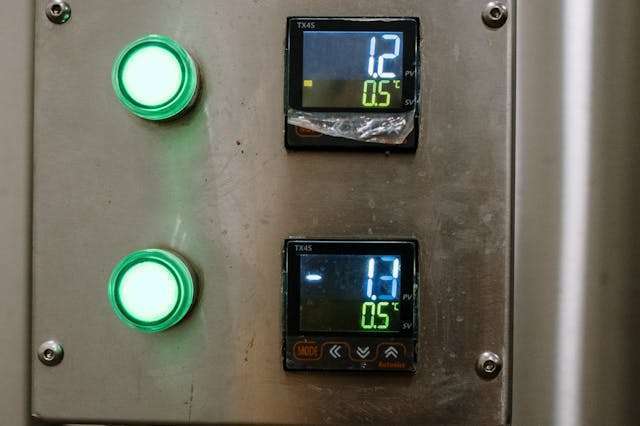How Industrial Temperature Controllers Enhance Process Efficiency
Industrial temperature controllers play a crucial role in optimizing operational processes across various industries. These devices are designed to maintain precise temperature levels within manufacturing environments, ensuring consistent quality, efficiency, and safety. This article explores the significance of industrial temperature controllers, their key functionalities, benefits, and their impact on enhancing overall process efficiency.
Understanding Industrial Temperature Controllers
Industrial temperature controllers are electronic devices used to regulate temperature within industrial processes such as manufacturing, chemical processing, food production, and more. They ensure that temperatures remain stable at desired setpoints, preventing fluctuations that can compromise product quality or process integrity.

Key Components and Operation:
- Sensors: Industrial temperature controllers use sensors (such as thermocouples or RTDs) to monitor the temperature of the environment or the product being processed.
- Controller Unit: This unit receives input from the sensors and compares it to the desired setpoint. It then sends signals to adjust heating or cooling elements accordingly.
- Output Devices: These devices control heaters, coolers, or other components to maintain the desired temperature.
Benefits of Industrial Temperature Controllers
1. Precision and Accuracy:
Industrial processes often require precise temperature control for consistent product quality. Temperature controllers ensure accuracy, reducing variations that could affect final product specifications.
2. Process Optimization:
By maintaining stable temperatures, controllers optimize process conditions, leading to improved efficiency and reduced waste. This is critical in industries where small deviations can lead to significant losses.
3. Energy Efficiency:
Efficient temperature control means optimal energy usage. Controllers minimize energy consumption by activating heating or cooling systems only when necessary, contributing to cost savings and environmental sustainability.
4. Safety and Reliability:
Stable temperatures enhance workplace safety by preventing overheating or underheating of equipment and materials. This reliability also reduces the risk of equipment failure and operational downtime.
Applications Across Industries
Industrial temperature controllers find applications in various sectors:
1. Manufacturing:
In manufacturing, controllers regulate temperatures in equipment like ovens, furnaces, and extruders, ensuring consistent product quality and efficient production rates.
2. Pharmaceuticals:
Temperature-sensitive drugs and vaccines require precise storage conditions. Temperature controllers maintain pharmaceutical storage facilities within optimal temperature ranges to preserve efficacy and safety.
3. Food and Beverage:
From food processing to cold storage, controllers maintain food safety standards by regulating temperatures in refrigerators, freezers, and cooking processes.
4. Chemical Processing:
Chemical reactions often require specific temperatures for optimal yields and safety. Controllers manage temperature conditions in reactors and storage vessels, minimizing risks and maximizing efficiency.
Features and Advanced Technologies
1. PID Control:
Proportional-Integral-Derivative (PID) control algorithms are common in advanced temperature controllers. They continuously adjust output to maintain stable temperatures more effectively than simple on-off control.
2. Data Logging and Connectivity:
Modern controllers offer data logging capabilities, recording temperature trends over time. Connectivity options like Ethernet or wireless interfaces enable remote monitoring and control, enhancing operational flexibility. For example, an advanced industrial temperature controller with data logging capabilities can help track and optimize temperature conditions continuously.
3. Alarm Systems:
Controllers can trigger alarms if temperatures deviate from setpoints, alerting operators to take corrective actions promptly, thereby preventing potential issues.
Case Study: Automotive Paint Curing Process
Problem:
An automotive assembly plant faces inconsistencies in the paint curing process, resulting in uneven finish quality and increased rework.
Solution:
Implementing precise PID-controlled temperature controllers in paint curing ovens ensures consistent curing temperatures. This stabilizes the paint drying process, improving finish quality and reducing rework by 20%.
Result:
The automotive manufacturer achieves higher production yields with fewer defects, enhancing customer satisfaction and operational efficiency.
Future Trends in Temperature Control Technology
1. IoT Integration:
Internet of Things (IoT) technologies are increasingly integrated into temperature controllers, enabling real-time monitoring, predictive maintenance, and automated adjustments based on data analytics.
2. AI and Machine Learning:
AI algorithms analyze temperature data patterns to predict optimal settings, enhancing efficiency and preemptively addressing potential process deviations.
3. Sustainability Focus:
Energy-efficient designs and eco-friendly refrigerants are becoming standard, aligning temperature control solutions with global sustainability goals.
Conclusion
Industrial temperature controllers are indispensable tools for enhancing process efficiency across diverse industries. By ensuring precise temperature management, these devices not only improve product quality and operational safety but also contribute to cost savings and environmental sustainability. As technology continues to advance, the role of temperature controllers in industrial processes will evolve, driving further improvements in efficiency and performance standards. Whether in manufacturing, pharmaceuticals, food processing, or beyond, the impact of temperature control technology remains pivotal in shaping modern industrial operations.
The post How Industrial Temperature Controllers Enhance Process Efficiency appeared first on The Total Entrepreneurs.
If you re eager to discover more about how we can elevate your digital presence, don t hesitate to explore our full range of services. Click on the link below to delve into a world of tailored strategies, innovative solutions, and a dedicated team ready to amplify your online impact. Your digital success story starts here.
Explore Our Services





